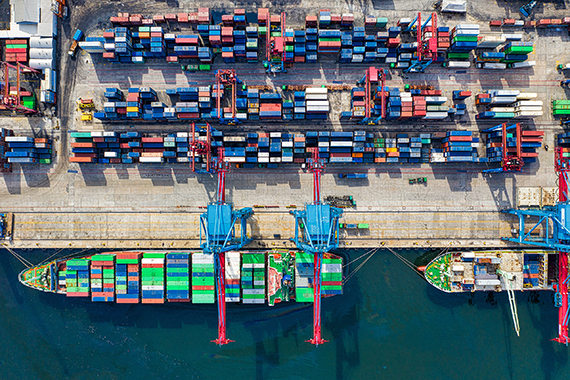 Flexibility to continue production is crucial for companies to remain resilient in the face of shocks to their supply chains, says Ananth Iyer (below), senior associate dean in the Krannert School of Management at Purdue University and director of the Global Supply Chain Management Initiative. (Stock photo)
Flexibility to continue production is crucial for companies to remain resilient in the face of shocks to their supply chains, says Ananth Iyer (below), senior associate dean in the Krannert School of Management at Purdue University and director of the Global Supply Chain Management Initiative. (Stock photo)
Supply Chain Shocks
How businesses can remain resilient amid coronavirus disruption
Coronavirus quarantines have shuttered factories and shocked global supply chains.
Flexibility to continue production is crucial for manufacturers that rely on components made in other countries, says Ananth Iyer, senior associate dean in the Krannert School and director of the Global Supply Chain Management Initiative.
Research shows that manufacturers are more likely to survive shocks to their supply chains if they have several options for suppliers, designs, transportation and production, Iyer says, noting that flexibility can be established in a variety of ways:
 Switch modes: “To satisfy demand, a company might switch from moving goods more slowly by sea to more quickly through air.”
Switch modes: “To satisfy demand, a company might switch from moving goods more slowly by sea to more quickly through air.”
Change designs: “Companies may have a preferred design using material A over material B. But in terms of choices, they can explore how much flexibility they have in their specifications without compromising safety or functionality, but still allowing things to work.”
Build a buffer: “In the particular case of the coronavirus, the news regarding the virus hit at just the time that a lot of workers were going for Chinese New Year, and most companies had planned for 30 to 60 days of inventory in advance. You can think of this as a buffer inventory. Companies are living down the buffer, and the question is whether the plants start coming back up to replenish the buffer.”
Prioritize products: “A company making 10 different products, with the last few products being low volume and not very profitable, might make fewer of the low-volume products and make more popular products to be able to satisfy demand.”
Leverage existing suppliers: “Existing suppliers really want manufacturers to continue to buy and produce, so if they have to help you out by producing a few other things, they will. Suppliers in the supply chain depend on the original equipment manufacturers, so it’s not as if manufacturers are out cold and nobody is going to help them. Every one of their suppliers is ready to help because they want to keep the flow going.”
Explore new sources: “A company may have chosen one supplier, but many others would have bid for the contract. You have other people on your list who you haven’t contracted with, but you know they’re certified; you know they’re high quality, but they just didn’t end up with the right price point, and they might be spread across the world.”
While logistics experts like Iyer expected that stores will quickly figure out how to cope with the surprise spike in purchasing, consumer behavior also continued to adapt. Some grocery stores sold out of food, hygiene products and cleaning supplies as schools and businesses across the United States closed their doors due to the spread of the novel coronavirus.
"The real reason for things running out is this 'run' by shoppers,” Iyer told NBC News. "They believe they need more of it and are not sure if it will be available when they want it. Retailers, given demand, will find a way to generate supply."
But Iyer said smaller stores in particular may have to pay more if they want to get resupplied sooner. Stores could try to persuade shoppers to take smaller orders now and sign up for the rest next week or to sign up for weekly delivery and get more shoppers to buy groceries online
“Increased purchases by consumers, if driven by fears of supply shortage, can be eased by assurance of supply,” he said. “Consumers may also be worried about travel restrictions, which could decrease their store visit frequency. In short, consumer purchases may reflect both rational calculations and forecasted future issues. However, a combination of assured supply through direct delivery, combined with immediate supply from the store, may be a measured approach to reassure consumers and manage costs.”
Next: How coronavirus could change the debate about paid time off in the U.S.








